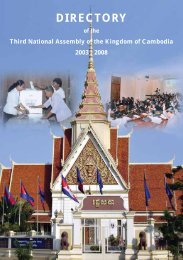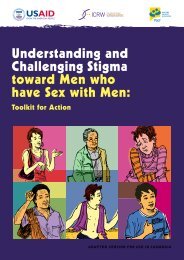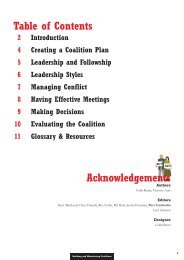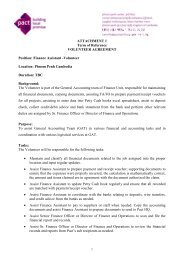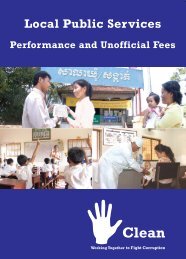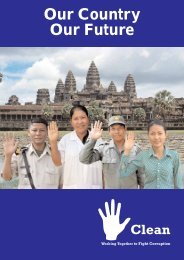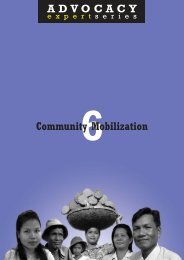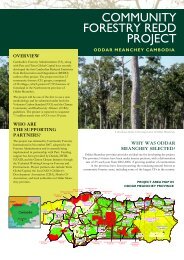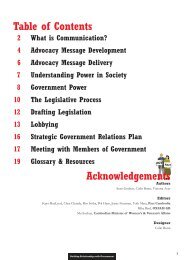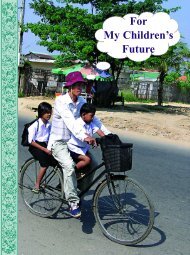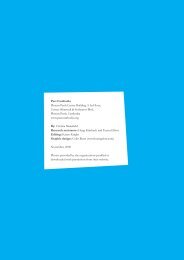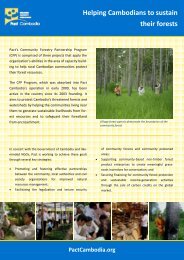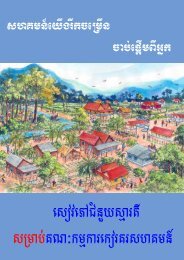Advocacy in Cambodia: Increasing Democratic ... - Pact Cambodia
Advocacy in Cambodia: Increasing Democratic ... - Pact Cambodia
Advocacy in Cambodia: Increasing Democratic ... - Pact Cambodia
You also want an ePaper? Increase the reach of your titles
YUMPU automatically turns print PDFs into web optimized ePapers that Google loves.
Case Studies<br />
estimates that 100,000 people are currently <strong>in</strong> a<br />
situation <strong>in</strong> which powerful players are try<strong>in</strong>g to<br />
displace them. While legal organizations track<br />
their own land cases, exact or even approximate<br />
figures on the extent of the problem are not readily<br />
available. Anecdotal evidence <strong>in</strong>dicates that the<br />
figures are astound<strong>in</strong>g, especially with regards to<br />
land concessions. The consensus is that<br />
resolutions are rare and usually only occur <strong>in</strong> civilto-civil<br />
cases. Resolutions <strong>in</strong> cases <strong>in</strong>volv<strong>in</strong>g the<br />
military or large companies are virtually nonexistent.<br />
Though petitioners who take a case to<br />
court generally receive some compensation, that<br />
compensation is generally <strong>in</strong>sufficient and is<br />
almost never actual land.<br />
Compla<strong>in</strong>ts filed with village and commune<br />
authorities tend to have no effect, so pla<strong>in</strong>tiffs go<br />
directly to the political opposition party or to the<br />
Prime M<strong>in</strong>ister’s residence. This strategy is not<br />
available to everyone however, as it requires<br />
personal connections, and often is unsuccessful<br />
as prov<strong>in</strong>cial authorities ignore directives sent<br />
from the central level.<br />
Legal aid organizations play an important<br />
role <strong>in</strong> ensur<strong>in</strong>g that NGOs provide appropriate<br />
guidance to communities, although they readily<br />
admit that they have been generally unsuccessful<br />
<strong>in</strong> protect<strong>in</strong>g the vulnerable from powerful figures.<br />
Though NGOs want to assist their communities,<br />
their ability to react is limited. A number of legal<br />
assistance organizations are work<strong>in</strong>g on land court<br />
cases, but their caseloads are becom<strong>in</strong>g quite full<br />
and they are experienc<strong>in</strong>g difficulties <strong>in</strong> secur<strong>in</strong>g<br />
funds for legal assistance programs. In addition,<br />
NGOs <strong>in</strong> local areas consider tak<strong>in</strong>g action aga<strong>in</strong>st<br />
powerful players <strong>in</strong>volved as risky, as NGOs often<br />
operate with little back<strong>in</strong>g or protection.<br />
Occasionally however, NGOs will organize public<br />
forums and <strong>in</strong>vite prov<strong>in</strong>cial representatives from<br />
the three political parties to meet with concerned<br />
villagers. NGOs also encourage villagers to place<br />
copies of their compla<strong>in</strong>ts directly <strong>in</strong>to the hands<br />
of high-rank<strong>in</strong>g officials when they visit the<br />
prov<strong>in</strong>ces to attend open<strong>in</strong>g ceremonies and other<br />
events, but caution villagers to slip papers to<br />
officials discretely. Nevertheless, NGOs and<br />
communities are becom<strong>in</strong>g bolder and legal aid<br />
organizations are ga<strong>in</strong><strong>in</strong>g experience, to the extent<br />
that small victories occasionally take place.<br />
NGOs cite the composition of land dispute<br />
resolution committees as one of the ma<strong>in</strong><br />
obstacles to obta<strong>in</strong><strong>in</strong>g resolution of land disputes.<br />
It is not unusual for a committee member to be<br />
directly or <strong>in</strong>directly <strong>in</strong>volved <strong>in</strong> a land dispute and<br />
therefore may stand to benefit personally from the<br />
outcome of the committee’s decision.<br />
Capacity Build<strong>in</strong>g by NGOs on Land<br />
Issues<br />
In July 1999, Oxfam GB, ADHOC, and CDRI<br />
held a national workshop on Institutional<br />
Cooperation for Resolv<strong>in</strong>g Land Disputes <strong>in</strong><br />
<strong>Cambodia</strong>. The outcome of the workshop was a<br />
decision for NGOs to study land disputes and their<br />
resolution at the local level. Researchers first met<br />
with the prov<strong>in</strong>cial dispute resolution<br />
commissions <strong>in</strong> five prov<strong>in</strong>ces. F<strong>in</strong>d<strong>in</strong>gs of the<br />
study <strong>in</strong>dicated that the commissions were<br />
constra<strong>in</strong>ed by a lack of operational funds and<br />
limited dispute resolution capacity. The study also<br />
revealed the extent of communication gaps<br />
between prov<strong>in</strong>cial/local authorities and the<br />
national government.<br />
As a result, <strong>in</strong> 2001 Oxfam GB conducted<br />
capacity build<strong>in</strong>g activities for stakeholders <strong>in</strong><br />
Kompong Speu prov<strong>in</strong>ce, <strong>in</strong>clud<strong>in</strong>g monks, NGO<br />
staff, government officials, military, former Khmer<br />
Rouge officers, and members of the land dispute<br />
resolution commission. Topics <strong>in</strong> the 12-day<br />
workshop <strong>in</strong>cluded conflict resolution, mediation<br />
and arbitration, land law, and the right to land. At<br />
the end of the course, members of the land dispute<br />
commission conducted a mock case us<strong>in</strong>g models<br />
for mediation and arbitration. After the workshop<br />
a former Khmer Rouge officer and a military<br />
officer were <strong>in</strong>vited to jo<strong>in</strong> the commission. This<br />
was done on the suggestion of prov<strong>in</strong>cial officials,<br />
who said that if land disputes occurred <strong>in</strong> military<br />
areas, those stakeholders would be needed to help<br />
resolve them.<br />
Land disputes are expected to <strong>in</strong>crease <strong>in</strong> the<br />
future as the land title project moves forward and<br />
titles held or created by powerful figures are<br />
discovered. NGOs estimate that at this time little<br />
is known about land deals. For this reason, it is<br />
important for NGOs to have resources to track<br />
disputes, to argue class action suits, and to have<br />
sufficient numbers of Bar Association-accepted<br />
lawyers who can plead <strong>in</strong> court.<br />
Composition of the Cadastral<br />
Commission<br />
The World Bank has begun work<strong>in</strong>g with the<br />
M<strong>in</strong>istry to strengthen the <strong>in</strong>stitution <strong>in</strong><br />
preparation for an expected 10-20 year land title<br />
registration project. NGOs have collaborated with<br />
the World Bank and the Council of Land Policy to<br />
create a Statement of the Royal Government on<br />
Land Policy. The Statement, which was published<br />
<strong>in</strong> May 2001, <strong>in</strong>dicates the government’s <strong>in</strong>tention<br />
to strengthen land tenure security, manage land<br />
and natural resources <strong>in</strong> a more susta<strong>in</strong>able and<br />
equitable manner, and promote equitable land<br />
distribution.<br />
56



